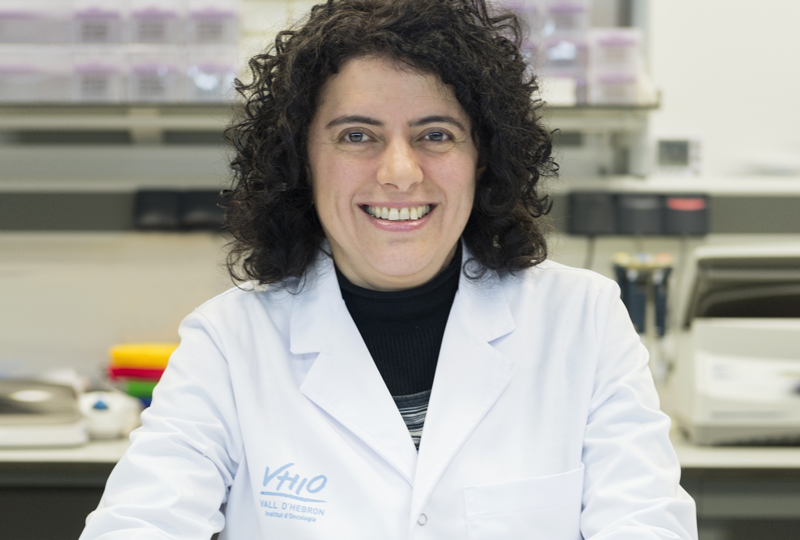
Using and extending data from a prospective patient cohort established under the framework of the former European Commission’s FP7-supported REQUITE*project*, this present 3-year RADprecise** translational collaboration will seek to render radiotherapy more precise by incorporating data from finely tuned predictive models to pre-identify toxicity based on insights from multiple biomarkers of radiosensitivity in individual patients.

Recently launched at the project’s kick off meeting, 11-12 June, and hosted by the consortium’s Coordinator, Jenny Chang-Claude at the German Cancer Research Center (DKFZ), Heidelberg, Germany, the seven participating partners***, including VHIO, will collectively apply findings at the clinical level by integrating a treatment planning system.
Using parametric models and machine learning, clinical investigators from academia and health research, in collaboration with small and medium enterprises as well as patient advocates, will apply new biological data as well as readily available genomic information to develop models that can more precisely envisage adverse effects from radiotherapy in individual patients – to be validated in independent samples.
More specifically, biological stratification will be enhanced by newly generated data from an ATM nucleoshuttling assay and transcriptomics/microRNA sequence analysis, the latter being led by VHIO’s Sara Gutiérrez-Enríquez, Senior Scientist of our Hereditary Cancer Genetics Group, directed by Judith Balmaña. Her designated work package will center on MicroRNA to establish clinically relevant profiles as novel biomarkers for radiotherapy-triggered side effects.
Commenting for VHIO Communications Sara Guitérrez-Enríquez observed, “Rendering radiotherapy more precise, reducing toxicity and improving the quality of life for an increasing number of our patients will demand informed decision making based on multiple biomarkers from blood and tissue, while factoring in the specificities of each individual’s particular disease.”
“At preclinical level, RADPrecise’s predictive models will be key to establishing a personalized radiotherapy treatment planning system towards tailoring this therapy to each patient’s sensitivity. Considering that an estimated five to ten per cent of all patients receiving radiotherapy either as primary treatment or in combination will suffer severe adverse effects, with a further fifty per cent thought to experience less severe yet burdensome ones, we must prioritize the identification of radiosensitive patients,” continued Sara, Principal Investigator of the microRNA profile work package alongside Orland Díez, Co-Senior Scientist of VHIO’s Hereditary Cancer Genetics Group, and Victoria Reyes, Alexandra Giraldo, and Manuel Altabas, Radiation Oncologists of our Radiation Oncology Group directed by Jordi Giralt.
It seems that RADprecise is on course to do just. Moreover, taking biological optimization further into the clinic, follow-up of the project’s patient population with breast and prostate cancer will be extended to up to five years to enable the long-term monitoring and recording of radiotherapy-related adverse effects and to collect new blood and skin samples for further development of RADprecise’s assay.
To discover more about VHIO’s participation in this project, please contact our Director of Communications, Amanda Wren, by email: awren@vhio.net.
###
References:
* REQUITE, Validating Predictive Models and Biomarkers of Radiotherapy Toxicity to Reduce Side-Effects and Improve Quality of Life in Cancer Survivors: www.requite.eu
REQUITE results reported in the literature:
REQUITE: A prospective multicentre cohort study of patients undergoing radiotherapy for breast, lung or prostate cancer. Seibold P, Webb A, Aguado-Barrera ME, Azria D, Bourgier C, Brengues M, Briers E, Bultijnck R, Calvo-Crespo P, Carballo A, Choudhury A, Cicchetti A, Claßen J,Delmastro E, Dunning AM, Elliott RM, Farcy-Jacquet MP, Gabriele P, Garibaldi E, Gómez-Caamaño A, Gutiérrez-Enríquez S, Higginson DS, Johnson K, Lobato-Busto R,Mollà M, Müller A, Payne D, Peleteiro P, Post G, Rancati T, Rattay T, Reyes V,Rosenstein BS, De Ruysscher D, De Santis MC, Schäfer J, Schnabel T, Sperk E,Symonds RP, Stobart H, Taboada-Valladares B, Talbot CJ, Valdagni R, Vega A,Veldeman L, Ward T, Weißenberger C, West CML, Chang-Claude J; REQUITE consortium. Radiother Oncol. 2019 May 27;138:59-67. doi: 10.1016/j.radonc.2019.04.034. [Epub ahead of print] PubMed PMID: 31146072.
**RADprecise – Personalized radiotherapy: Incorporating cellular response to irradiation in personalized treatment planning to minimise radiation toxicity, is supported by funding received through ERAPerMed’s co-funded Joint Translational Call 2018 entitled, Research Projects on Personalised Medicine – Smart Combination of Pre-Clinical Research with Data and ICT Solutions. www.erapermed.eu.
*** RADprecise’s work packages and respective lead partner/PIs:
1) Establish cohort with long-term follow-up/project coordination
German Cancer Research Center (DKFZ), Germany – PI: Jenny Chang-Claude
2) ATM nucleoshuttling
Neolys Diagnostics, France – PI: Julien Gillet-Daubin
3) microRNA profiles
Vall d’Hebron Institute of Oncology (VHIO), Spain – PI: Sara Gutiérrez-Enríquez
4) Transcriptomics
Fundación Pública Galega Medicina Xenómica (FPGMX), Spain – PI: Ana Vega
5) Prediction Models
Fondazione IRCCS Istituto Nazionale ei Tumori (INT), Italy – PI: Titziana Rancati
Politecnico di Milano (POLIMI), Italy – PI: Paolo Zunino
6) Biologically-extended treatment planning system (TPS) and market access
Aquilab, France – PI: David Gibon
Politecnico di Milano (POLIMI), Italy – PI: Paolo Zunino








